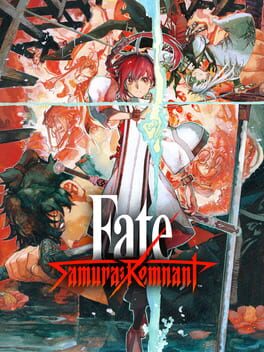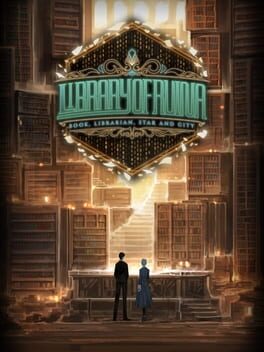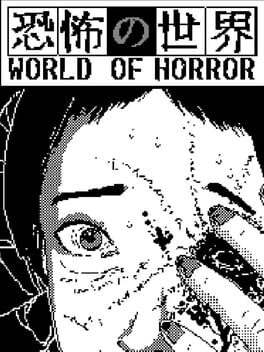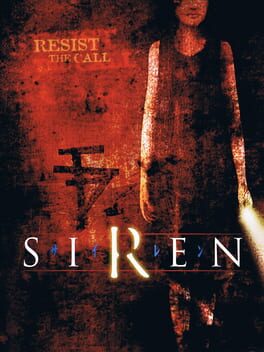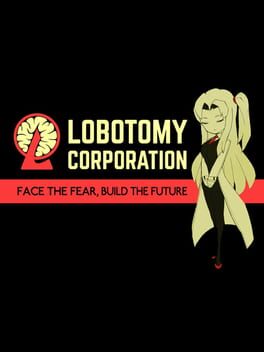smhomg
191 Reviews liked by smhomg
Fate/Samurai Remnant
2023
Fantastic game! Combat was relatively enjoyable, but the strength really is the story. Full experience to understand everyone's character requires all routes, which I did and it all pans together so incredibly well. Iori's probably one of my most favorite fate protagonists now. I really recommend people to play it. It's not just a licensed anime game, I really came out of it enjoying it and feeling positive about the franchise. It's a good game for anyone, a fantastic game for fans. I hope it's successful and we get more like this, with higher budget.
Baldur's Gate 3
2023
Muv-Luv Alternative
2006
Signalis
2022
Signalis
2022
This review contains spoilers
Gestalt is an unified configuration of elements (biological, symbolical, physical, etc.) that has properties or characteristics that cannot be derived from the mere sum of its parts.
Signalis is a game of many different inspirations: survival horror, symbolist paintings, weird fiction, anime, retrofuturism, and many, many more. Yet to describe Signalis as belonging to any "canon" of its influences, or a more abstract "successor" is a disservice to the game.
Many (especially the least flattering reviews) have focused on this aspect of the game; it's successful (or failed) attempt at capturing the identity of some of the most beloved and influential pieces of art of this "era". Does it play like the memory of playing Resident Evil? Does it make you feel just like the time you played Silent Hill 2? Does it slowly creep on you like the slow descent into the madness of Lovecraft? Does it create a meaningful metaphor like the one that Evangelion left you with? Does it beacon you like Arnold Böcklin's evocative Isle of the Dead?
I find these questions utterly vapid.
I could talk about how the "classic survival horror gameplay" is perfectly executed, being at the same time deeply rewarding for the adept and knowledgeable, and incredibly punishing for those who don't have a grasp on it. How the constant threat of lingering enemies, the fear of losing your last hour of progress that you so stupidly forgot to save, creates a balance of tension on the player comparable to the one experienced by the character.
I could talk about the artstyle: a perfect blend of gorgeous pixel art and PSX models with a "slick, modern look" that fits perfectly the motifs of it's archaic but futuristic technology. The glitching and scanlines of the player's world married so perfectly to the setting of the game. How this principle extends not just to the visuals, but to the sounds; both music and effects. The soundtrack, the radio signals, the screams, the shots, the beating of the flesh. Everything coming together cohesively to deliver the setting with impeccable immersion.
I could even about how the ways to achieve the endings explore a deeper relationship between the player and the character. Elster's final "choice" is based entirely on how the player approaches the game (and yes, this includes the Artifact ending). It may be frustrating for certain "completionist" players, but that's the point: you're not meant to get everything, you're meant to experience what your Elster would do. That's your "true" ending, that's what happened in the loop you played. The requirements are so obscure and impossible to fully control (for the three "base" endings) exactly so that the player can feel a deeper connection between their style of play and the ending they got.
The Artifact ending is just yet another iteration on this. Approaching the game as a game. The ARG elements are simply yet another "playstyle", and thus deserving of its own ending, carrying possibly the same "meta" connotations that the playing session did.
But even all this is just scratching the surface of Signalis. This is just the sum of the parts.
-
The King in Yellow is a fictional play in the homonymous book by Robert W. Chambers. The play appears as a connecting tissue between all the different stories of the book, as a forbidden entity, something that for some unknown reason drives character to madness or ruin.
Signalis's narrative is convoluted to say the least. Questions often lead to more confusion than a definitive answer; and while there's definitely plenty to figure out by paying close attention, not everything is meant to be "solved".
Living in [current year], lore discussion is inevitable. People fighting with each other and themselves to find the one true reading of the game. The dreaded question: "What is this game actually about?". Humanity? Personhood? Conviction? Love? Loss? Trauma?
As many have said, but it warrants repeating, there is no true answer. Signalis is not an allegory, the violent imposition of THE reading of the work.
Signalis is about a lot of things.
I, as a queer lesbian so deeply obsessed with futuristic bodies, can't help but make it about love. A love so strong and so resonant that it breaks the whole fabric of the world.
Of course, my reading of this continues, but that's the main point. And while I do think that people downplaying or outright opposing the weight of the romance in the narrative are blind and obtuse at best (and "not-so-nice-people" at worst), I do think one can get plenty more out of this game, without it necessarily nullifying anything else.
The searches for the one true meaning are, frankly, insane. Nothing is gained by forcing Signalis into a box of allegory, making unbreakable links between what is figurative and what is "actual".
You can, obviously, interpret Signalis wrong, but the right way, the correct answer, is nowhere to be found.
-
Gestaltzerfall is shape decomposition. When a complex shape is observed for a long time, it decomposes in the mind of the observer, only appearing as the connected parts that make it.
I don't think there's anything quite like Signalis.
It is not "Silent Hill 2 but". It is not "Lovecraft but". It is only Signalis.
I finished this game long before writing this review. I had thought "what a nice little game" at first, until I found myself slowly thinking about it more and more.
It has stayed as a constant presence in my mind more than any game ever did. It is now an inseparable part of me. It shaped me.
Signalis is an experience unlike any other.
It's love, it's pain, it's fear, it's joy.
It is hope, it is angst. It is death, and it is life.
Signalis is a game of many different inspirations: survival horror, symbolist paintings, weird fiction, anime, retrofuturism, and many, many more. Yet to describe Signalis as belonging to any "canon" of its influences, or a more abstract "successor" is a disservice to the game.
Many (especially the least flattering reviews) have focused on this aspect of the game; it's successful (or failed) attempt at capturing the identity of some of the most beloved and influential pieces of art of this "era". Does it play like the memory of playing Resident Evil? Does it make you feel just like the time you played Silent Hill 2? Does it slowly creep on you like the slow descent into the madness of Lovecraft? Does it create a meaningful metaphor like the one that Evangelion left you with? Does it beacon you like Arnold Böcklin's evocative Isle of the Dead?
I find these questions utterly vapid.
I could talk about how the "classic survival horror gameplay" is perfectly executed, being at the same time deeply rewarding for the adept and knowledgeable, and incredibly punishing for those who don't have a grasp on it. How the constant threat of lingering enemies, the fear of losing your last hour of progress that you so stupidly forgot to save, creates a balance of tension on the player comparable to the one experienced by the character.
I could talk about the artstyle: a perfect blend of gorgeous pixel art and PSX models with a "slick, modern look" that fits perfectly the motifs of it's archaic but futuristic technology. The glitching and scanlines of the player's world married so perfectly to the setting of the game. How this principle extends not just to the visuals, but to the sounds; both music and effects. The soundtrack, the radio signals, the screams, the shots, the beating of the flesh. Everything coming together cohesively to deliver the setting with impeccable immersion.
I could even about how the ways to achieve the endings explore a deeper relationship between the player and the character. Elster's final "choice" is based entirely on how the player approaches the game (and yes, this includes the Artifact ending). It may be frustrating for certain "completionist" players, but that's the point: you're not meant to get everything, you're meant to experience what your Elster would do. That's your "true" ending, that's what happened in the loop you played. The requirements are so obscure and impossible to fully control (for the three "base" endings) exactly so that the player can feel a deeper connection between their style of play and the ending they got.
The Artifact ending is just yet another iteration on this. Approaching the game as a game. The ARG elements are simply yet another "playstyle", and thus deserving of its own ending, carrying possibly the same "meta" connotations that the playing session did.
But even all this is just scratching the surface of Signalis. This is just the sum of the parts.
-
The King in Yellow is a fictional play in the homonymous book by Robert W. Chambers. The play appears as a connecting tissue between all the different stories of the book, as a forbidden entity, something that for some unknown reason drives character to madness or ruin.
Signalis's narrative is convoluted to say the least. Questions often lead to more confusion than a definitive answer; and while there's definitely plenty to figure out by paying close attention, not everything is meant to be "solved".
Living in [current year], lore discussion is inevitable. People fighting with each other and themselves to find the one true reading of the game. The dreaded question: "What is this game actually about?". Humanity? Personhood? Conviction? Love? Loss? Trauma?
As many have said, but it warrants repeating, there is no true answer. Signalis is not an allegory, the violent imposition of THE reading of the work.
Signalis is about a lot of things.
I, as a queer lesbian so deeply obsessed with futuristic bodies, can't help but make it about love. A love so strong and so resonant that it breaks the whole fabric of the world.
Of course, my reading of this continues, but that's the main point. And while I do think that people downplaying or outright opposing the weight of the romance in the narrative are blind and obtuse at best (and "not-so-nice-people" at worst), I do think one can get plenty more out of this game, without it necessarily nullifying anything else.
The searches for the one true meaning are, frankly, insane. Nothing is gained by forcing Signalis into a box of allegory, making unbreakable links between what is figurative and what is "actual".
You can, obviously, interpret Signalis wrong, but the right way, the correct answer, is nowhere to be found.
-
Gestaltzerfall is shape decomposition. When a complex shape is observed for a long time, it decomposes in the mind of the observer, only appearing as the connected parts that make it.
I don't think there's anything quite like Signalis.
It is not "Silent Hill 2 but". It is not "Lovecraft but". It is only Signalis.
I finished this game long before writing this review. I had thought "what a nice little game" at first, until I found myself slowly thinking about it more and more.
It has stayed as a constant presence in my mind more than any game ever did. It is now an inseparable part of me. It shaped me.
Signalis is an experience unlike any other.
It's love, it's pain, it's fear, it's joy.
It is hope, it is angst. It is death, and it is life.
Library of Ruina
2021
I really shouldn't be scoring this game so high. I don't like turn-based combat, I don't like deck-builders, and I think that Lobotomy Corporation's fundamental design is the true genius of Project Moon on paper.
But this has an insane level of polish, its cutscenes are charming enough to keep me invested, and most importantly, it (seemingly) doesn't have a mechanic that utterly ruins it like Ordeals did for Lobotomy Corporation. It's a game which has earned my begrudging respect.
But this has an insane level of polish, its cutscenes are charming enough to keep me invested, and most importantly, it (seemingly) doesn't have a mechanic that utterly ruins it like Ordeals did for Lobotomy Corporation. It's a game which has earned my begrudging respect.
